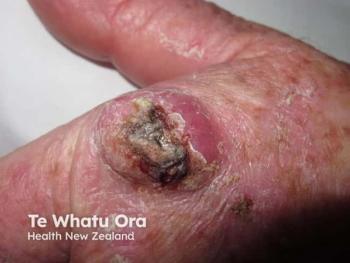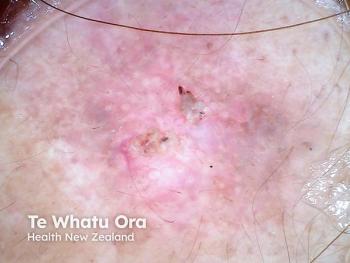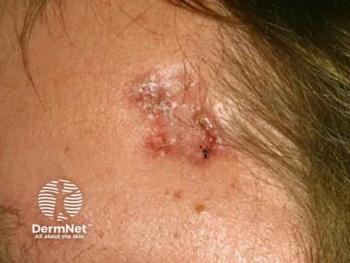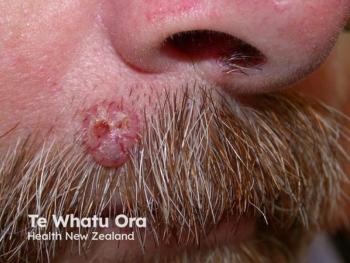
- Dermatology Times, May 2022 (Vol. 43. No. 5)
- Volume 43
- Issue 5
- Pages: 38
Optimize Co-management Planning to Combat Advanced BCC
Two experts offer a step-by-step guide to creating an effective multidisciplinary treatment team.
Brent Moody, MD, FACP, FAAD, a dermatologic surgeon with Heritage Medical Associates in Nashville, Tennessee, and Kent Shih, MD, a medical oncologist at Tennessee Oncology in Gallatin, Tennessee, provided step-by-step guidance for multidisciplinary management of patients with locally advanced basal cell carcinoma (BCC) in a non-CME session presented in the product theater at the American Academy of Dermatology 2022 Annual Meeting.1
Identify Which Patients Are at Risk
Moody opened the presentation with an overview of clinical factors that increase the risk of recurrence in patients with BCC2:
- Location: The “mask” areas of the face, genitals, hands, and feet as well as cheeks, forehead, scalp, neck and pretibial
- Size: 220 cm on trunk and extremities
- Pathology: Poorly defined borders, aggressive growth pattern2, perineural involvement
- History: Recurrent disease, prior radiology
- Other: Immunosuppression
He also pointed to data that showed incomplete excision increases the likelihood of BCC recurrence 27% versus 6% in cases with complete excision.3 “Progression of advanced BCC can cause significant invasion of surrounding tissue or, more rarely, nodal or distant metastasis,” he noted.4
Ground Rules for Team Building
With the aggressive growth pattern of the disease and the risks involved, Moody recommended a multidisciplinary approach to creating and executing on a comprehensive care plan.
Citing American Academy of Dermatology Guidelines, Moody advised including a dermatologist, radiation oncologist, medical oncologist, MOHs surgeon, pathologist, physician assistant or nurse practitioner, pharmacist, and other surgical oncologists on that team.5
Even before the first meeting, Moody and Shih stressed the importance of establishing a workable framework for team members. Key concerns to cover in initial discussions with prospective team members would be how each physician would partner in decision-making, how often the group would meet during assessments and initial treatment planning, and how long they would continue to be involved in the patient’s care after establishing a care plan.
Co-managing Systemic Therapies
According to Moody, collaborative approaches can be highly beneficial in determining which patients are not or are no longer good candidates for surgery or radiation as well as finding options for those who are not appropriate candidates for hedgehog inhibitor therapy or who already have discontinued it.
“Systemic therapies can play a critical role in their management,” he said.
Shih added that a cross-disciplinary team of specialists also broadens perspectives on how/when to start these therapies, what the treatment goals should be—whether that means cure, stable disease, or palliative care, how tolerability issues should be addressed, and, depending on outcomes, if/when certain treatments should be discontinued.
This can be particularly important in shared decision-making for diseases such as advanced BCC with limited treatment options. Surgery is not always a consideration based on factors ranging from multiple recurrences or disease progression after previous operations to the number of tumors. Also, Moody and Shih noted that more than 90% of patients ultimately stop hedgehog inhibitor therapy because of intolerability of adverse effects such as hair loss and muscle, disease progression, or the patient’s decision to withdraw.6-9
This specialty-spanning expertise can play a role in evaluating new therapies. For example, cemiplimab (Libtayo; Sanofi and Regeneron Pharmaceuticals) may offer a choice for patients with advanced BCC who have failed traditional solutions, according to Moody and Shih. This FDA-approved antibody blocks the programmed death cell-1 (PD-1) pathway which helps reactivate T-cell receptor. That blockade restores anti-tumor activity.10
According to Shih and Moody, “it helps to have the multidisciplinary team’s alignment” in evaluating outcomes of drugs new to the armamentarium. For advanced BCC, that means prioritizing not only efficacy and safety, but also durability, they said. “Collaboration can be key to curating the right treatment to the right patient on every level,” they concluded.
Disclosure
Moody and Shih were compensated for their participation in the product theater presentation Co-managing patients with locally advanced basal cell carcinoma (BCC) in an evolving treatment landscape sponsored by Sanofi and Regeneron Pharmaceuticals at the American Academy of Dermatology 2022 Annual Meeting, held March 25-29, 2022 in Boston, Massachusetts.
References
1 Moody B, Shih K. Co-managing patients with locally advanced basal cell carcinoma (BCC) in an evolving treatment landscape. Presented at: American College of Dermatology 2022 Annual Meeting. Held March 25-29, 2022 in Boston, Massachusetts.
2 Referenced with permission from NCNN Clinical Practice Guidelines in Oncology (NCNN Guidelines®) for basal cell skin cancer V.12022©National Comprehensive Cancer Network, Inc,2021. All rights reserved. Accessed November 17, 2021.
3. Codazzi D, Van Der Velden J, Carminati M, Bruschi S, Bocchiotti MA, Di Serio C, Barberis M, Robotti E. Positive compared with negative margins in a single-centre retrospective study on 3957 consecutive excisions of basal cell carcinomas. Associated risk factors and preferred surgical management. J Plast Surg Hand Surg. 2014 Feb;48(1):38-43. doi: 10.3109/2000656X.2013.800526. Epub 2013 Jun 4. PMID: 23731130.
4. Migden MR, Chang ALS, Dirix L, Stratigos AJ, Lear JT. Emerging trends in the treatment of advanced basal cell carcinoma. Cancer Treat Rev. 2018 Mar;64:1-10. doi: 10.1016/j.ctrv.2017.12.009. Epub 2017 Dec 14. PMID: 29407368.
5. Work Group; Invited Reviewers, Kim JYS, Kozlow JH, Mittal B, Moyer J, Olencki T, Rodgers P. Guidelines of care for the management of basal cell carcinoma. J Am Acad Dermatol. 2018 Mar;78(3):540-559. doi: 10.1016/j.jaad.2017.10.006. Epub 2018 Jan 10. PMID: 29331385.
6. Lear JT, Migden MR, Lewis KD et al. Long-term efficacy and safety of sonidegib in patients with locally advanced and metastatic basal cell carcinoma: 30-month analysis of the randomized phase 2 BOLT study. J Eur Acad Dermatol Venereol. 2018 Mar;32(3):372-381. doi: 10.1111/jdv.14542. Epub 2017 Nov 6. PMID: 28846163; PMCID: PMC5873455.
7. Sekulic A, Migden MR, Basset-Seguin N, et al.ERIVANCE BCC Investigators. Long-term safety and efficacy of vismodegib in patients with advanced basal cell carcinoma: final update of the pivotal ERIVANCE BCC study. BMC Cancer. 2017 May 16;17(1):332. doi: 10.1186/s12885-017-3286-5. Erratum in: BMC Cancer. 2019 Apr 18;19(1):366. PMID: 28511673; PMCID: PMC5433030.
8. Lewis K, Dummer R, Farberg AS, et al. Effects of Sonidegib Following Dose Reduction and Treatment Interruption in Patients with Advanced Basal Cell Carcinoma During 42-Month BOLT Trial. Dermatol Ther (Heidelb). 2021 Dec;11(6):2225-2234. doi: 10.1007/s13555-021-00619-4. Epub 2021 Oct 20. PMID: 34669179; PMCID: PMC8611137.
9. Lacouture ME, Dréno B, Ascierto PA, Dummer R, et al. Characterization and Management of Hedgehog Pathway Inhibitor-Related Adverse Events in Patients With Advanced Basal Cell Carcinoma. Oncologist. 2016 Oct;21(10):1218-1229. doi: 10.1634/theoncologist.2016-0186. Epub 2016 Aug 10. PMID: 27511905; PMCID: PMC5061532.
10. Burova E, Hermann A, Waite J, et al. Characterization of the Anti-PD-1 Antibody REGN2810 and Its Antitumor Activity in Human PD-1 Knock-In Mice. Mol Cancer Ther. 2017 May;16(5):861-870. doi: 10.1158/1535-7163.MCT-16-0665. Epub 2017 Mar 6. PMID: 28265006.
Articles in this issue
over 3 years ago
Vitiligo’s Emerging Drug Pipelineover 3 years ago
Aesthetics in Skin of Color: Pearls and Precautionsover 3 years ago
Integrative, Allopathic Approaches Add Options for Pediatric ADover 3 years ago
Study Invites Second Look at Carvedilolover 3 years ago
Cut the Learning Curve for Acne in Skin of Colorover 3 years ago
Evaluating Job Opportunities: Financial Factors to Considerover 3 years ago
New Cosmeceutical Ingredientsover 3 years ago
CME Credits, Drug Companies, and Freedom of Speechover 3 years ago
Emergent Applications for Platelet-Rich PlasmaNewsletter
Like what you’re reading? Subscribe to Dermatology Times for weekly updates on therapies, innovations, and real-world practice tips.


















